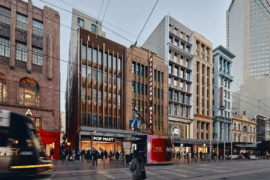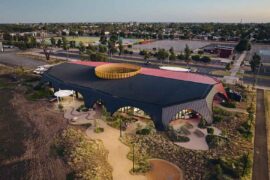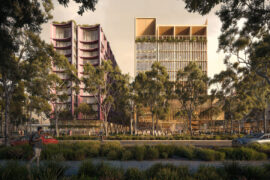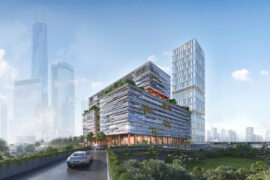The Architects Accreditation Council of Australia has released the new National Standard of Competency for Architects prioritising First Nations peoples and sustainability.

Consider the bar raised. The newly released 2021 National Standard of Competency for Architects (NSCA) has formalised two principles vital to the modern practice of architecture in Australia: respect for the environment and our First Nations peoples.
“Embedded within the practice of architecture is the recognition of Aboriginal and Torres Strait Islander Peoples’ ongoing connection and custodianship of Country, and the ethical responsibilities to the physical environment and the transition to a carbon-neutral built environment. These responsibilities are fundamental to architecture practice,” it states.
To be rolled out progressively in three stages over the coming 12 months, the updates come as the result of the Architects Accreditation Council of Australia’s (AACA) five-yearly review and have been developed through an 18-month-long process involving in-depth research and close engagement with stakeholders.
“We are proud that the 2021 NSCA enshrines a greater focus on more meaningful engagement with our First Nations peoples. As this year’s NAIDOC Week theme – Heal Country! – so clearly highlights, we have a long way to go in achieving real reform and reconciliation,” says Kathlyn Loseby, chief executive officer for AACA.
“We recognise that fundamental change is needed in the relationship Australia has with Aboriginal and Torres Strait Islander peoples,” she continues.
“We also acknowledge that we have so much to learn from the rich history and oldest continuing cultures on earth, not least when it comes to how we care for Country.
“With our climate in crisis and the built environment accounting for 36% of energy consumption, 38% of energy- related carbon emissions and 50% of resource consumption globally – and expected to double in total footprint by 2060i – urgent action is required.
“Architects are at the forefront of our capacity to transform the built environment’s impact on our climate into a carbon-neutral one. The NSCA is a critical tool in this change,” she says.
The staged rollout will start in January 2022 for the National Program of Assessment, July 2022 for the Experienced Practitioner and Overseas Qualification Assessment, and January 2023 for Accreditation and the Architectural Practice Exam.
A copy of the 2021 NSCA is available at aaca.org.au
Feature image: Newman Health Clinic by Kaunitz Yeung Architecture for Puntukurnu Aboriginal Medical Services (PAMS). Photo by Robert Frith Acorn Photography.
INDESIGN is on instagram
Follow @indesignlive
A searchable and comprehensive guide for specifying leading products and their suppliers
Keep up to date with the latest and greatest from our industry BFF's!

Merging two hotel identities in one landmark development, Hotel Indigo and Holiday Inn Little Collins capture the spirit of Melbourne through Buchan’s narrative-driven design – elevated by GROHE’s signature craftsmanship.

Now cooking and entertaining from his minimalist home kitchen designed around Gaggenau’s refined performance, Chef Wu brings professional craft into a calm and well-composed setting.

In a tightly held heritage pocket of Woollahra, a reworked Neo-Georgian house reveals the power of restraint. Designed by Tobias Partners, this compact home demonstrates how a reduced material palette, thoughtful appliance selection and enduring craftsmanship can create a space designed for generations to come.

At the Munarra Centre for Regional Excellence on Yorta Yorta Country in Victoria, ARM Architecture and Milliken use PrintWorks™ technology to translate First Nations narratives into a layered, community-led floorscape.

The master plan and reference design for Bradfield City’s First Land Release has been unveiled, positioning the precinct as a sustainable, mixed-use gateway shaped by Country, community and long-term urban ambition.

Monash University Malayasia will be making its presence felt with a grand new project in Kuala Lumpur.
The internet never sleeps! Here's the stuff you might have missed

In creative spaces, headphones do more than just play music.

The Royal Institute of British Architects (RIBA) has announced that the Irish architect, educator and writer will receive the 2026 Royal Gold Medal for architecture.